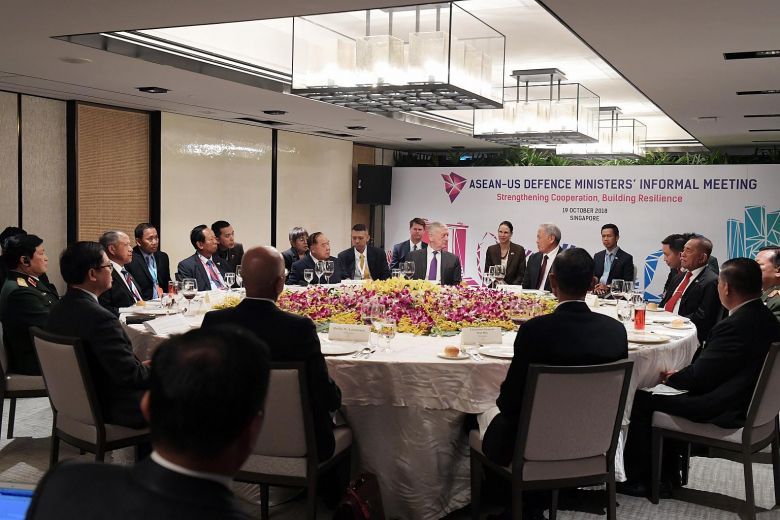US, China, Russia join Asean in pledge to fight terror

US Secretary for Defense James Mattis (centre, left) and Singapore Defence Minister Ng Eng Hen (centre, right) at the Asean-US Defence Ministers’ Informal Meeting, on Oct 19, 2018. THE STRAITS TIMES PHOTO
SINGAPORE — The Association of Southeast Asian Nations (Asean) along with partners including the US, China and Russia on Saturday pledged to strengthen regional cooperation in the fight against terrorism, with Singapore Defense Minister Ng Eng Hen saying that the devastating siege of Marawi last year must never be repeated.
In a joint statement issued at the end of the 5th Asean Defense Ministers’ Meeting-Plus (ADMM-Plus), the countries, which also include Australia, India, Japan, New Zealand and South Korea, said they will “undertake effective measures to counter terrorism”, such as sharing of information and intelligence.
“We stress that terrorism can only be defeated by a sustained and comprehensive approach at the national and international levels,” the statement added.
The 18 defense ministers – whose combined militaries account for 90 percent of the world’s troops – also gave their support for the world’s first multilateral air guidelines to reduce the likelihood of accidents involving military aircraft.
Speaking to reporters after the meeting he chaired at the Shangri-La Hotel, Dr Ng said none of the 18 defense ministers there did not view terrorism as a “real and present threat”.
Article continues after this advertisementHe said all agreed that the sharing of intelligence was the most important platform on which to fight terror, which was underscored by how much, in hindsight, the Marawi threat was underestimated.
Article continues after this advertisementThe five-month armed conflict between the Philippine security forces and militants which ended last October left more than 1,000 dead and the city in ruins.
“The devastation was very large given that there were only about a few hundred troops. And the reconstruction cost amounted to US$1 billion (S$1.38 billion). So I think we all felt this must never happen again to any city within Asean,” said Dr Ng.
The church bombings in Surabaya, Indonesia, in May when children as young as nine took part along with family members showed a modus operandi that was “not only new, but worrying”, added Dr Ng, who also pointed out other emerging threats.
“For us in this part of the world… even as the situation in Iraq and Syria improves, we’re expecting more foreign fighters to come this way.”
On Friday, Asean adopted the “Our Eyes” initiative, an Indonesian-led counter-terrorism intelligence-sharing platform that previously was between only six Asean countries. This effort was supported by ADMM-Plus ministers in the joint statement.
In a second joint statement, Asean welcomed the adoption of the air guidelines to reduce the likelihood of accidents that could escalate into a conflict.
The ADMM-Plus countries such as China and the United States expressed their intention to explore their application of the guidelines.
“We all know that if there’s a physical incident, it changes the name of the game,” said Dr Ng.
“It changes the complexion, it creates a cascade of activities which you cannot control.”
He said that it “wasn’t a given” that the Asean countries would have agreed on the code. But “having agreed on them, there is in that sense moral encouragement, if not moral pressure, on your eight larger countries to say, ‘If Asean countries can agree on it, why can’t we?'”
This year’s summit was the first time joint statements were issued since 2013, when the second ADMM was held in Brunei.
Singapore has also handed over chairmanship of the ADMM and ADMM-Plus to Thailand.
Dr Ng said that all ministers felt significant progress had been made at this latest summit, and “as a result of these initiatives… Asean, ADMM and ADMM-Plus had cemented their role as the de facto security architecture for this region”.